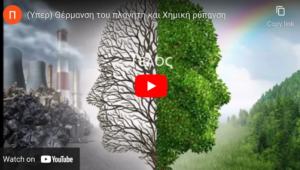News . Best Practices Climate change and pollution (Best Practice Greece)

This good practice describes an open education activity with an open scenario developed by Karaiskou Anna and Antonis Fountoulakis during the period 2020-2021. The activity took place at the 11th high school of Heraklion and the ultimate objective of the project was to make students aged 15-18 years old realize that they can find practical solutions to topical issues, that concern the wider society. This open schooling activity required imagination, reflection and proper organization of information and research data.
During the study and research stage of the sub-testing topic we met with science professionals, such as a biochemist Assistant Professor at the Department of Chemistry of the University of Crete, a chemistry researcher specializing in research on climate change and the detection of hazardous pollutants with precision sensors, and a researcher at the Centre for Materials Technology and Photonics at the Hellenic Mediterranean University of Crete.
CARE: The students successfully presented key questions for the continuation of the scenario.
KNOW: The main objective of the activity was to engage in a participatory research project to develop strategies for the prevention and control of Covid-19 (and other similar infectious diseases) and also to investigate how it is possible to build themselves a sensitive device to detect and study aerosols indoors using an Arduino microprocessor.
DO: The students prepared articles and presentations related to the issue that concerned them. The success of the children was the correct scientific research through articles that they presented to scientists, as well as the completion of the practical part of the scenario that concerned the design of the carbon dioxide sensor.
Findings: This initiative had the consent of parents and opened opportunities for dialogue with the family, students, and teachers.
Outcomes: In addition, it gave the students the opportunity to escape from sterile theoretical knowledge and to think outside the box of curriculum, which gave them confidence. The children acquired a positive attitude towards research topics. It was very important for them to realize that research starts from everyday concerns.